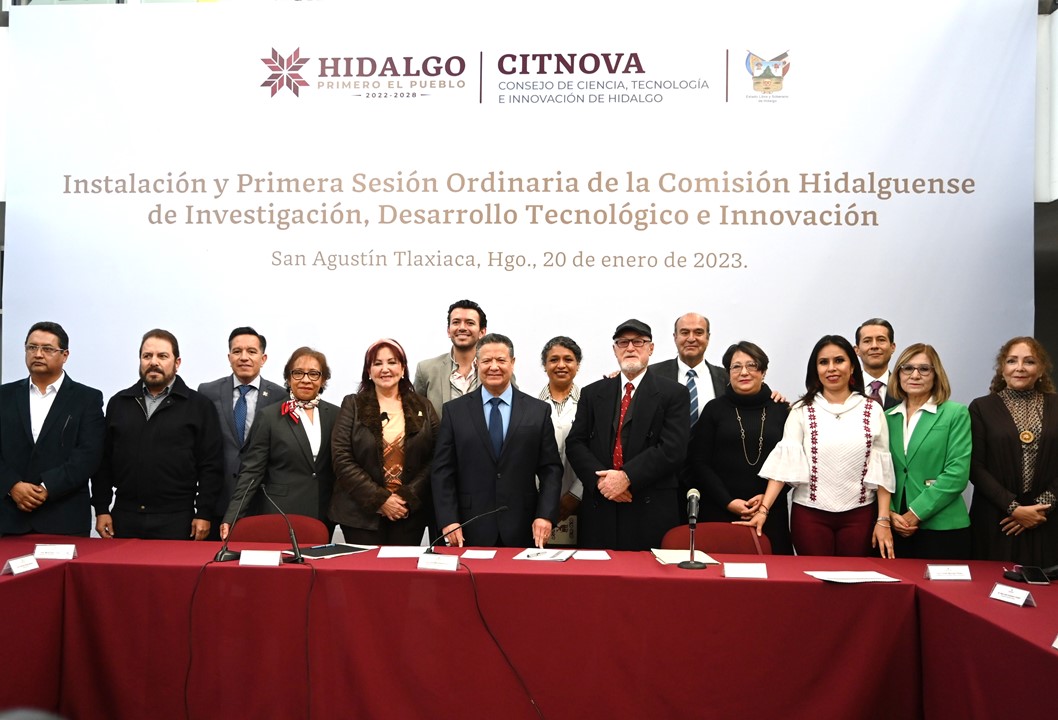San Agustin Tlaxiaca, HGO: To achieve equitable progress, it is necessary to strengthen communities and tap into the potential of different sectors of the population. For this reason, one of the priority actions of the Hidalgo Science, Technology and Innovation Council (CETNOVA) was to reactivate, after 15 years, the Hidalgo Commission for Research, Technological Development and Innovation.
During the first regular session, Francisco Patiño Cardona, Director of Citenova, reported that in order to guide public policies in favor of the entity, the Commission will be composed of three intersectoral committees: Health, Social Welfare and Environment; Science, education and entrepreneurship; As well as urban development and economic development. These committees will seek to integrate science and technology into the service procedures provided to the people of Hidalgo.
Governor Julio Menchaca Salazar, in his capacity as Chairman of the Commission, noted that all mechanisms established by law will be used to advance the state transformation project that promotes technological development, innovation and scientific knowledge to solve public and regional problems. state.
The participation of scientists, technologists, inventors, businessmen and academics from Hidalgo was an essential element in defining and achieving the goals set by the transition government on the path to achieving a more prosperous state, and therefore, in order to know their concerns and requests, Citnova organized “meetings with the scientific community, researchers and technicians in the state of Hidalgo”.

It involved actors from the state's quadruple helix (government, academia, business and society), in order to analyze the impacts and benefits enshrined in the general law of humanities, technologies and innovation, from different perspectives and contexts. (HCTI Law), introduced by President Andrés Manuel López Obrador and promoted by the National Council of Science and Technology (Conacyt).
The aim of the meetings was to promote and encourage research, innovation and technological development with a humanistic approach to the right to science, to promote scientific culture in society, as well as to organize and create the foundations for the application of resources allocated to this topic.
For these meetings, Francisco Patiño Cardona visited the various academic institutions of the entity, in nine strategic regions of the state of Hidalgo, each of which has special problems (environmental, social, economic, technological, health, etc.), whose aim is to offer a solution on a scientific basis. And technological, as well as integrating the needs of society itself to enhance its development in these areas.
The proposals and proposals for the Humanities, Science, Technology and Innovation Law of the State of Hidalgo have been integrated into a repository and analyzed using the scientific method, with the aim of obtaining qualitative and quantitative data. The results of this study were reported in a technical report, delivered by Patiño Cardona, to the First Permanent Committee on Science and Technology of the Hidalgo State Congress, chaired by Representative Marcia Torres Gonzalez.

“Social media evangelist. Student. Reader. Troublemaker. Typical introvert.”

:quality(85)/cloudfront-us-east-1.images.arcpublishing.com/infobae/TEQF6EONZRFGLLLDIDD4L2O4EE.jpg)

:quality(75)/cloudfront-us-east-1.images.arcpublishing.com/elcomercio/XU32LRAEZFDDPNVHLFU3CKVBYY.jpg)



More Stories
Venezuela ranks fourth in female leadership in science and technology in Latin America
In Portuguesa and Sucre they explore the wonderful world of science
The university court overturns the expulsion of two teachers and a chemical sciences student